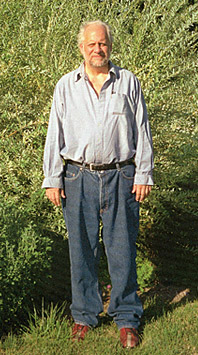Gardens Of The Fall
The proverbial naïve optimist brought low by reality, Candide might be the first modern hero. Certainly, he was the first modern gardener. In the image popularized by the 18th century French novelist Voltaire—”tending your own garden”—Candide is a metaphor for pursuing, and enduring, one’s own path, perhaps even “minding your own business”, in the best sense of the phrase.
However, it is compelling that Voltaire chose the garden as his example. He prophesied the concepts of not only the uniqueness of the individual and the modern notions of individuality, but also our infamous cultivation of the self. Perhaps even the extreme example of the 20th century’s “cult of personality”—an individual separated from the pack or community, just as a garden is cut off from the hustle and bustle of daily life—is an outgrowth of Candide’s famous garden plot.
A bright star in the enlightened galaxy of French literature, Voltaire was popular and influential throughout the world. The horticultural image he created, probably while working in his own estate garden, contributed to the new spirit of the entrepreneur in the emerging Industrial Revolution. Our modern definition of the marketplace stems from Candide: a gathering spot for the fruit of one’s labors, as well as those of many other individuals. After all, Voltaire wrote in the late 1700s, the time of the first modern democratic revolutions. For example, if there is a “marketplace of ideas”, in today’s parlance, then there must be “idea gardens” where they grow. This concept spurred his pioneering efforts in creating the world’s first encyclopedia—a tree of knowledge, indeed, and an early ancestor of the Internet.
Perhaps it was even Voltaire who most ennobled the common merchant and laid the groundwork, the “soil”, for the growth of the modern businessman—someone pragmatic and, literally, common, yet resolved to making something enduringly good.
No wonder, then, that he chose the gardener as his metaphor. For example, capitalists engage with the “common market”, or the trading place of those commodities that are comprised mostly of grains, fruits and vegetables. The buyers and sellers of these goods laid the foundation of Wall Street.
For what is “fruit” but the fruit of the gardener’s labor? Not only does one “invest” oneself in agriculture and gardening, but the image of the garden resonates in the Parable of the Talents. Maybe Voltaire was being sly, and actually advocating a lesson of scripture in disguise. This Biblical episode would seem to be the historic first appearance of the paradigm that created the modern industrial world.
Thus, today’s ordinary citizens “grow” their portfolios, as if each was a unique garden. Stocks grow or, neglected, catch diseases and die. With the clumsy tools we have now, investing has become as perilous as getting out of Oz. As Dorothy said, “We must cross this strange place in order to get to the other side.” Compared to today’s investors, she had it easy.
Ironic, then, that many experts cite as the greatest risk takers of all to be—not stockbrokers or hedge fund managers—but the American farmer, who risks his crops to both the weather and the commodity markets where the farmers’ “fruits” are betted against each other. The goal is that society always benefits from the lowest prices. However, the farmer gains only in the tricky balance between one neighbor’s success and another’s failure. Think of Las Vegas and you get the idea.
How does the recent explosion of interest in gardening help us redefine our denatured concept of “work”? Perhaps the homegrown vegetable trend will lead us back to the garden where “labor” possesses its original meaning and purpose. Home and community gardens can become part of the nation’s new life style, just as the small farm can become a rejuvenated part of the nation’s industry.
Autumn does not have to be the season of despair. As we labor into fall, we can resolve that our jobs of supplying family and neighbors with fresh, delicious food will never be outsourced. With a new grove of perennial fruit trees and bushes, and an asparagus, garlic and rhubarb patch—all ideal for planting this season—your garden will grow in size. Indeed, it may be only the small farm, community and home garden that possess, in large measure, the two greatest ingredients of work: a tangible bounty and a sense of personal satisfaction.
And, there’s one unique bonus at this particular company: You will be the only person who will ever fire yourself. But I believe, after the first bite, you will have a job for life.

I am having trouble with mushrooms. They are coming up in among my roses and are very hard to control.. I used a fungicide on them but they came back again. Do you have any suggestions? Thank you.
Dear Phoebe,
Nothing to fear from mushrooms growing from the soil. Their appearance in your garden reveals the richness of your soil, or at least the presence of an abundance of decaying organic matter — a key component in healthy, life-enhancing soil. Dampness also encourages their growth; if you have experienced all the regular rainfall we have been getting here in southeastern Pa. this summer, you are bound to find some mushrooms somewhere. To reduce their appearance, you can try cultivating the soil and removing (and possibly replacing)any woody mulch, but sometimes it is very difficult to eliminate mushrooms since their extensive, hidden, undergound mycelia can spread far and wide, and their spores can easily be scattered, too, in the removal process. Also, any old dead tree or shrub roots sometimes remain for years underground, and from these decaying roots wood decay mushrooms will sprout above the soil surface.
Bill Rein – Burpee Horticulturist